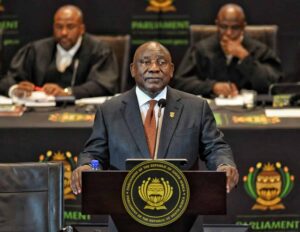
Ramaphosa asserts GNU will rebuild public trust in democracy
During the Presidency budget vote debate, Ramaphosa has acknowledged concerns about the size of the national executive

President Cyril Ramaphosa is answering questions in Parliament following the presentation of the Presidency’s budget vote.
Ramaphosa delivered his first budget address for the Presidency in the seventh administration, in front of members of Parliament on Tuesday. This laid the foundation for the Presidency’s spending in the 2024-2025 financial year.
RAMAPHOSA REPLIES TO PRESIDENCY BUDGET VOTE DEBATE
Ramaphosa says many people chose not to vote in the 29 May polls and some are turning to extremes or even turning
against democracy itself.
He says now more than ever, they need to demonstrate what the people of South Africa can achieve if they work together.
“We must seize the opportunity that this Government of National Unity presents to restore these people’s trust in our democracy, and to realise the promise of dignity and equality that is contained in our Constitution,” the president said.
Ramaphosa says the Presidency, like the rest of the Executive, is committed to honouring its accountability to Parliament, and there is a possibility of the formation of a dedicated oversight committee.
The head of state says a number of MPs have raised the issue of the bloated executive.
Many political parties have complained about the bloated cabinet arguing that it will be a burden to taxpayers.
On 30 June 2024, Ramaphosa named an executive consisting of 76 members (one deputy president, 32 ministers and 43 of their deputies) after weeks of negotiations and wrangling between 11 parties of the 18 represented in Parliament.
Ramaphosa says as Parliamentarians, their actions should show that they are there to serve people, not to enrich themselves or to
access positions of privilege.
“Above all, let us show that government will work for the people and that we can create a new era of growth and prosperity in our country.
That is the task which the Presidency will focus on over the next five years, working closely with all departments and all spheres of government to implement the priorities that we have set out,” the president said.
The Presidency controls the country’s intelligence after the State Security Agency’s functions were absorbed into it, along with housing multiple ministries, such as the Minister of Performance, Monitoring and Evaluation as well as Administration and the Minister of Women, Youth and Persons with Disabilities.
The country’s climate action and the anti-corruption advisory bodies also work from the Presidency.
